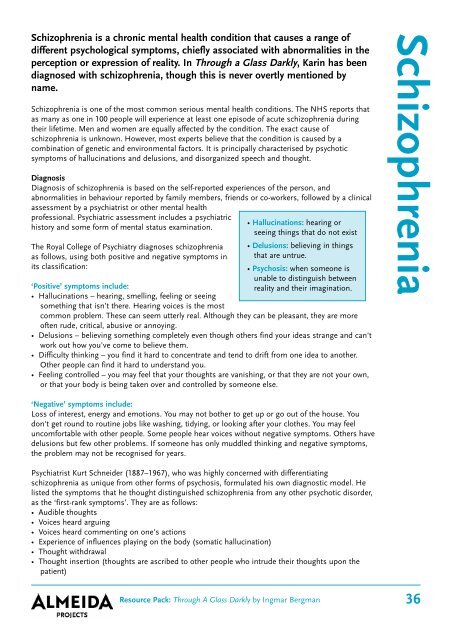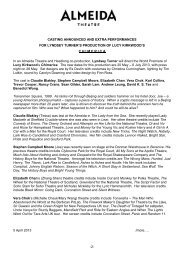Through a Glass Darkly - Almeida Theatre
Through a Glass Darkly - Almeida Theatre
Through a Glass Darkly - Almeida Theatre
- No tags were found...
Create successful ePaper yourself
Turn your PDF publications into a flip-book with our unique Google optimized e-Paper software.
Schizophrenia is a chronic mental health condition that causes a range ofdifferent psychological symptoms, chiefly associated with abnormalities in theperception or expression of reality. In <strong>Through</strong> a <strong>Glass</strong> <strong>Darkly</strong>, Karin has beendiagnosed with schizophrenia, though this is never overtly mentioned byname.Schizophrenia is one of the most common serious mental health conditions. The NHS reports thatas many as one in 100 people will experience at least one episode of acute schizophrenia duringtheir lifetime. Men and women are equally affected by the condition. The exact cause ofschizophrenia is unknown. However, most experts believe that the condition is caused by acombination of genetic and environmental factors. It is principally characterised by psychoticsymptoms of hallucinations and delusions, and disorganized speech and thought.DiagnosisDiagnosis of schizophrenia is based on the self-reported experiences of the person, andabnormalities in behaviour reported by family members, friends or co-workers, followed by a clinicalassessment by a psychiatrist or other mental healthprofessional. Psychiatric assessment includes a psychiatrichistory and some form of mental status examination.The Royal College of Psychiatry diagnoses schizophreniaas follows, using both positive and negative symptoms inits classification:‘Positive’ symptoms include:• Hallucinations – hearing, smelling, feeling or seeingsomething that isn’t there. Hearing voices is the most• Hallucinations: hearing orseeing things that do not exist• Delusions: believing in thingsthat are untrue.• Psychosis: when someone isunable to distinguish betweenreality and their imagination.common problem. These can seem utterly real. Although they can be pleasant, they are moreoften rude, critical, abusive or annoying.• Delusions – believing something completely even though others find your ideas strange and can'twork out how you've come to believe them.• Difficulty thinking – you find it hard to concentrate and tend to drift from one idea to another.Other people can find it hard to understand you.• Feeling controlled – you may feel that your thoughts are vanishing, or that they are not your own,or that your body is being taken over and controlled by someone else.Schizophrenia‘Negative’ symptoms include:Loss of interest, energy and emotions. You may not bother to get up or go out of the house. Youdon't get round to routine jobs like washing, tidying, or looking after your clothes. You may feeluncomfortable with other people. Some people hear voices without negative symptoms. Others havedelusions but few other problems. If someone has only muddled thinking and negative symptoms,the problem may not be recognised for years.Psychiatrist Kurt Schneider (1887–1967), who was highly concerned with differentiatingschizophrenia as unique from other forms of psychosis, formulated his own diagnostic model. Helisted the symptoms that he thought distinguished schizophrenia from any other psychotic disorder,as the ‘first-rank symptoms’. They are as follows:• Audible thoughts• Voices heard arguing• Voices heard commenting on one's actions• Experience of influences playing on the body (somatic hallucination)• Thought withdrawal• Thought insertion (thoughts are ascribed to other people who intrude their thoughts upon thepatient)Resource Pack: <strong>Through</strong> A <strong>Glass</strong> <strong>Darkly</strong> by Ingmar Bergman 36
















